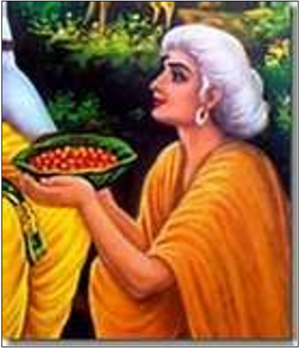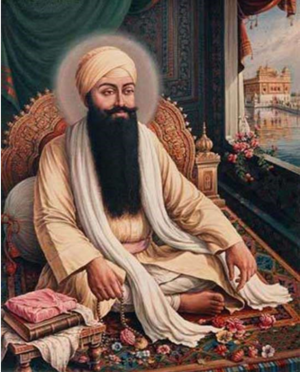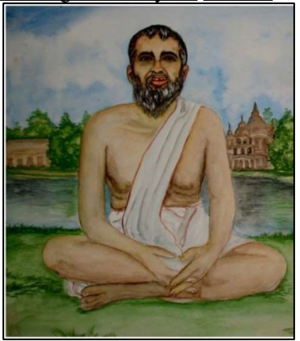Talk:Nirahaṃkāra: Humility And Absence of Pride
By Vishal Agarwal
Bhagavān resides within everyone. When we love others, honor them, and respect them, we are doing the same to Bhagavān. Conversely, if we hate and disrespect others, then we are abusing Bhagavān no matter how many ceremonies and prayers we may do. We should not show pride, conceit, or arrogance towards anyone. Instead, we should treat everyone with the request. We must not try to put others down and try to project ourselves as superior to others. Whenever we get acclaim or recognition, we must always credit it to others who have helped us, and also thank Bhagavān for his grace in enabling it. We should also respect others irrespective of who they are.
Humility and Respect are often two sides of the same coin. Humility involves lowering ourselves in front of others, whereas respect means elevating the person in front of us. If is not possible to be humble and disrespectful at the same time. Humility exalts us - it does not make us small. Similarly, we do not become smaller when we give respect to another person. Shri Chaitanya Mahāprabhu has said:
Consider yourself as less important than a blade of grass. Be more forbearing than a tree. Do not crave respect, but respect others. Always sing the praise of Hari’s name. Shikshāṣhtaka of Chaitanya, verse 3
Story: The Humility of Shabari
Shabari was a humble and simple tribal lady who lived in a hut close to the banks of the sacred lake Pampā. Many Rishis came every day to take a bath in that lake. Some of them looked at Shabari with contempt, thinking that she was a tribal woman, and therefore inferior to them. But Shabari did not feel bad at their attitude towards her. On the contrary, she would sweep the path leading to the lake every day so that no thorns or stones hurt the feet of the Rishis when they went to take their bath in the lake. One day, Shabari got a bit late and she was still sweeping the path when the Rishis came by to go to the lake. The Rishis who had contempt for Shabari started scolding her angrily for blocking their way. Shabari merely apologized to them with a lot of humility and respect and went back to her hut. Bhagavān did not like the fact that the Rishis had humiliated Shabari, who was a great Bhakta, and a very humble lady. So, He changed the water of the lake into blood. The Rishis were shocked to see the transformation of the water to blood. Bhagavān Rama then told the Rishis to seek forgiveness of Shabari because only she could purify the lake again. They went to the hut of Shabari and apologized profusely. Then, they requested her to come to the lake and dip the big toe of her foot in the lake. Shabari accepted their apologies and said that she was not worthy of being apologized to by the revered Rishis. Reluctantly, she went to the lake. As soon as she dipped the toe, the blood changed back to clear water! The Rishis got their lesson – the humble Bhakti of the tribal woman was superior to their arrogant spiritual austerities in the eyes of Bhagavān. Parable: Bhagavan Krishna Cleans Dirty Dishes King Yudhishthira was the ruler of the kingdom of Indraprastha in the region of New Delhi in northern India. His well-wishers advised him to perform the ceremony called Rajasūya. After performing this ceremony, they said, Yudhishthira would be regarded as the emperor of the whole of India. Invitations were sent to all the kings of India to attend the ceremony and they were asked to come with presents for Yudhishthira. Lord Krishna, who was the king of faraway Dwaraka in western India also came. Everyone wanted to help organize the grand function. Lord Krishna also requested that he too be given some tasks to complete. However, as he had come from a long distance and was the last one to arrive, the only duty that he could get was cleaning the kitchen after the feast was over. Everyone requested Lord Krishna not to worry about doing this dirty job. They said that servants could take care of cleaning the kitchen. However, Lord Krishna insisted that he too wanted to help and would be pleased to do this dirty job. According to tradition, all the guests had to select a chief guest among them. This chief guest had to be someone very respectable and noble. He alone could put the crown of the Emperor of India on the head of King Yudhishthira. Everyone thought that Lord Krishna was the greatest of all those who were in the function. Therefore he was appointed as the chief guest for the entire ceremony. After the program was over and Yudhishthira had been crowned as the Indian emperor, everyone decided to take some rest. However, Lord Krishna, the chief guest, was nowhere to be found. When people went out to look for him, they found him in the main hall, where he was picking up dirty dishes and carrying them to the kitchen for cleaning. Everyone was very moved to see how Lord Krishna kept his word. Even though Krishna was the chief guest and the greatest of all, he performed his duty very humbly. Most people would have thought that picking dirty dishes and cleaning them was a blue-collar task that only humble servants should perform. But our Lord Krishna thought the opposite.
Story: Guru Arjan Dev constructs the Loftiest Mandir in Amritsar
The fifth Sikh Guru Shri Arjan Dev decided to construct a beautiful Mandir at the center of a pond called Ramseur in Amritsar in northern India. His disciples came to him and said, “Guru-ji, this Mandir should be the tallest building in the area. This will signify its importance.” The Guru smiled and said, “There is no need to have a tall building for the Mandir. It is only a fruit-laden tree whose branches bow.” And so, the Harimandir was constructed and its height was kept low. When the Mandir was completed, Guru Arjan Dev composed a hymn comparing the Mandir in the middle of the lake to Hari (Vishnu) lying on the Sheshanāga in the ocean of milk.
Story: Swami Ramakrishna Paramahamsa does not mind being called a gardener by his admirer
Dr. Mahendranath Sarkar, a renowned physician of Kolkata, once went to the Dakshineshwar temple to see Swami Ramakrishna Paramahamsa for the first time. On his way to the Swami’s room of the Swami which was located in the temple complex, the physician stopped in the temple gardens. He saw a man taking a stroll. Taking him to be a gardener, Sarkar asked him, “I am on my way to meet the great Swami Ramakrishna Paramahamsa. I wish to gift him a bouquet. Can you pluck some for me?” The man obliged and soon got him a few flowers. Later on, when the physician arrived to listen to the sermon of the Swami, he was shocked to find that the man he had thought of as a gardener was none other than the Swami!



